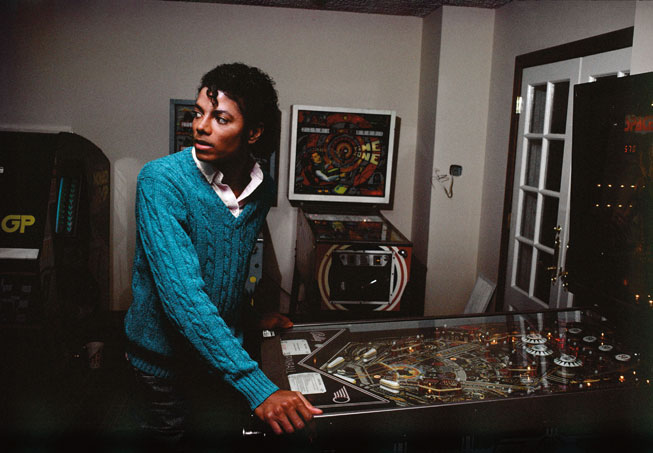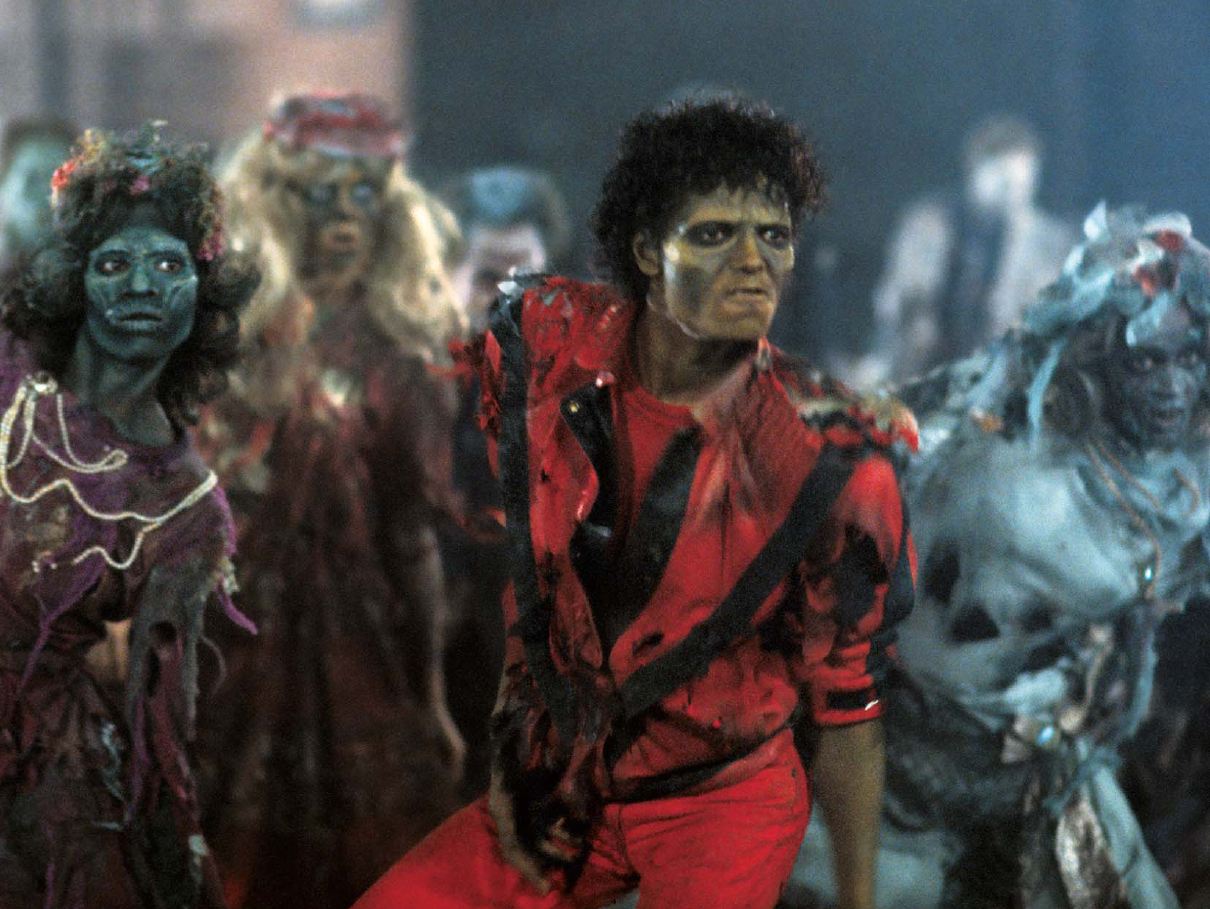
This past Saturday marked the second anniversary of Michael Jackon’s death, and we wouldn’t be the Mockingbirds that we are if we didn’t commemorate it somehow. Below you’ll find an excerpt of our friend Brent Kuhlman’s excellent paper “Justification: Forensically Speaking!” Pastor Kuhlman would be the first to admit that some of the inspiration for the material came from, well, yours truly. Needless to say, I’m very flattered. If you’ve never heard the sermon I preached the week of MJ’s passing, which I consider one of my proudest moments, I’ve embedded it at the bottom of the post. So without any further ado, let’s, you know, be startin’ something:
Forensic justification encompasses all our life – and everyone else’s too!
For example — 1983. A gargantuanly huge year for singer and entertainer Michael Jackson! He released Thriller. By the end of the year over thirteen millions copies of the album sold in the United States and almost twenty-two million worldwide! CBS reported that at one time during that year the album was selling at the rate of 500,000 per week! The best prior sales of an album was the soundtrack to Saturday Night Fever (twenty-five million worldwide). Thriller went on to sell more than fifty million copies worldwide. It would spend thirty-seven weeks at number one on the Billboard charts. Until Thriller no other solo album had sold more than twelve million copies. In addition, prior to Thriller no other album had ever spawned seven Top Ten singles: “Billie Jean,” “Beat It,” “The Girl is Mine,” “Human Nature,” “Wanna Be Startin’ Somethin’,” “PYT,” and “Thriller.” Staggering numbers of success!
The twenty-five year old was a superstar and multi-millionaire! J. Randy Taraborrelli contends, “The more Thriller was heard – and it was probably the most played record of all time, both privately and on the radio – the better it sounded. Michael and Quincy [Jones] had achieved their goal: to many listeners – whites, blacks, highbrows, heavy metal fans, teeny-boppers, parents – Thriller was the perfect album, every song an exercise in pop music production, every arrangement, every note in perfect place. This achievement made Michael more than a hero; the music industry promoted him to higher ground, almost sainthood.”
Michael Jackson! The twenty-five year old music hero and singer saint! That’s one judgment. But there were other judgments. And one judge was chronic: the inner critic! P.T. Barnum’s mission statement was: “The Greatest Show on Earth!” He was one of Michael’s heroes. And that too was Michael’s motto. He was a perfectionist in everything. He had to put out another album that was even better than Thriller. “Michael’s phenomenal sales, along with his astounding talent, established a precedent of excellence with Thriller – and one that he would secretly attempt to surpass for the rest of his career.”
The pursuit for more “perfection” leads Michael to the produce “Thriller” as a video for MTV. That too was an immense success. However, there were more critics. Can you guess? The elders of the Encino Kingdom Hall! Michael was summoned to appear before them. The state of his soul was part of the discussion. Michael was enraged and frightened all at the same time (since he was a devout Jehovah’s Witness). The elders threatened to banish him unless he stopped production on the video. In the end the video was released with a disclaimer at the beginning: “Due to my strong personal convictions, I wish to stress that this film in no way endorses a belief in the occult – Michael Jackson.”
He was bigger than Elvis. Bigger than the Beatles! A superhero! The “Best Ever!” Millions of adoring fans! One admirer was Fred Astaire. In 1983 he called to congratulate Michael after his performance of “Billie Jean” with the exhibition of the moon walk for the television special of Motown 25: Yesterday, Today, and Forever. Gene Kelly was a fan too!
Yet at the same he accrued huge critics from the music industry, his family (especially his father and brothers), and the world. The repeated plastic surgeries! He looked neither male nor female, black nor white! Weird antics! Then accusations of inappropriate behavior with young boys! Holding his child over the balcony rail! “Wacko Jacko!” “Freak Show!” “Most disturbed!”
 His entire life was lived forensically! He was always judging himself and being judged by others (positively and negatively). In Michael’s case his forensic life was without a Christian preacher (although baptized in a Lutheran church in Gary, IN he became a devout Jehovah’s Witness at the age of five). And that’s not good. He was always trying to do what only God can do and give: redeem, reconcile, and rebirth. Michael desperately wanted to redeem his lost childhood, reconcile his past, and be reborn through the help of science. People try to play God constantly, though few, if any, have had the same sort of vision and resources of Michael Jackson. Taken to the extreme – playing God looks like insanity. On one level, there is no more egregious offender of the First Commandment than Michael Jackson.
His entire life was lived forensically! He was always judging himself and being judged by others (positively and negatively). In Michael’s case his forensic life was without a Christian preacher (although baptized in a Lutheran church in Gary, IN he became a devout Jehovah’s Witness at the age of five). And that’s not good. He was always trying to do what only God can do and give: redeem, reconcile, and rebirth. Michael desperately wanted to redeem his lost childhood, reconcile his past, and be reborn through the help of science. People try to play God constantly, though few, if any, have had the same sort of vision and resources of Michael Jackson. Taken to the extreme – playing God looks like insanity. On one level, there is no more egregious offender of the First Commandment than Michael Jackson.
All life is lived forensically. Michael Jackson’s forensic life without a preacher led him to seek relief by justifying his existence before all his critics (judges)! It was a search for an escape. He lived, as Paul Speratus wrote, in a “false misleading dream” that filled his ears with lies of self-justification. It all ended very badly. And then at his funeral many took their turns justifying Michael’s life. When you are not justified by faith in Jesus, well … and that’s how it goes with most funerals, isn’t it?
You too live forensically. There is that inner critic that always accuses and excuses everything you do or don’t do. There are the external critics too. When you were young (and perhaps still to this day) your parental units asked: “Why can’t you be more like your brother?” or shouted, “Live up to your potential!” Perhaps you were shocked to hear from your friends: “She’s just not that in to you.” After coming out of your mother’s womb the doctor immediately scored you. Perhaps you were always the last kid picked for the team. Grades: good or bad / or both! “How many do your worship on Sunday?” “You didn’t do that correctly!” “You always do that!” “Why didn’t you do that?” “Why did you do that?” And then you attempt to justify yourself. And you insist on being right! It is your life!
And so Oswald Bayer observes: “Our whole life histories are placed before a permanent tribunal in which we act as accused, prosecutor, and judge. Throughout our lives we continually seek to find excuses for the fact that we live as we do, that we are existent rather than nonexistent, and that we are as we are and not something else.” How true! Kareem Abdul-Jabbar laments and contends that he deserves a statue outside of the Staples Center. Dominiqu Strass-Kahn must defend himself against the charges of raping a maid. You, the husband complain: “She didn’t say anything to me this morning!” Or: “I’m offended by what she said.” And then the thought and hate police of a brave new world go to work. Compare what happened with the reign of terror during the French Revolution. Osama Bin Laden’s tribunal came by the bullet of a navy seal. And so Bayer maintains:
I constantly vacillate, even to the very end of my life, between the judgment others make about me and my own judgment of myself. I am constantly trying to ascertain others’ judgment about me and my own judgment of myself; I arrive at some point of calm, and then become unsure of myself again. My identity is a floating one. Who am I? asked Dietrich Bonhoeffer. Am I what others say about me? Am I what I know about myself? Am I balanced between these different evaluations? Questions such as these relate to my inner being, not just to something external. They affect the core, not the shell. It is not true that judgment is an addition to being. What I am, I am in my judgment about myself, intertwined with the judgment made of me by others. Person is a ‘forensic term.’
As promised, the sermon in question:
p.s. As for the rumors that a full-sized, original version of the MJ-ET poster hangs framed in the Mockingbird office… no comment.

COMMENTS
One response to “The (Forensic) Justification of Michael Jackson”
Leave a Reply















I just searched and found this (for probably the 5th time over the years) seeking the Bayer quote.
Three, no four things:
• I can’t believe there are no comments
• This is wonderful!
• You should post this again as a “From the Archives” type of post.
and fourth
“Person is a ‘forensic term.'” might be one of the most intriguing and illuminating 5 word lines I have read in a long time. . .